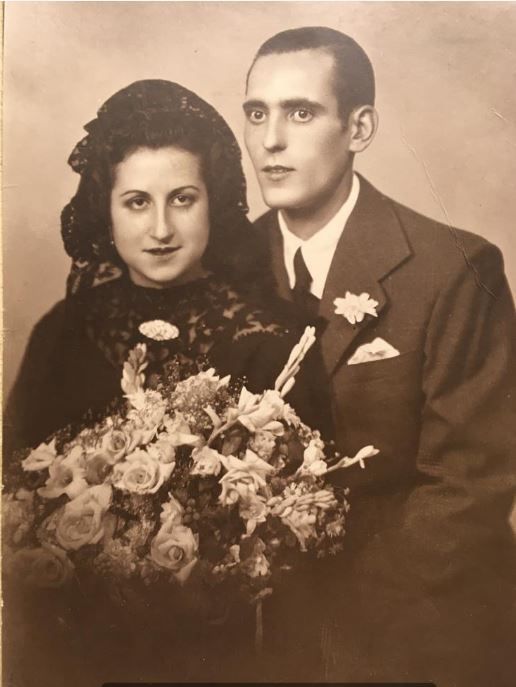A love story that took place in the courtyard of a Francoist prison
The letters that a prisoner wrote to a neighbour who lived in front of him and whom he married have been published

BarcelonaIn 1940 political prisoners and common criminals crowded into the prison of Manresa, a former convent near the houses in Sant Bartomeu street. It was there that the love story between Vicent Prades, 22 years old and from Sant Fruitós de Bages - who was awaiting trial for having fought on the Republican side - and Lola Batlle, an 18 year old neighbour who lived in front of the prison, began. They wrote passionate letters to each other for two years and, when he got out, they got married. Then he went back to prison and the letters continued.
This story could have died without a trace had it not been for the fact that the more than 200 letters Prades wrote between 1940 and 1943 were rescued by Domènec Guimerà. He bought them at the Celrà street market in February 2015 and fell so much in love with the words and the characters that he devoted the last years of his life to transcribing and contextualising them. Now some of his fragments are available to everyone on the website of the Associació Memòria i Història de Manresa (Manresa Memory and History Association). None of Lola's writings have been preserved.
The Francoist prison, today converted into the Casal de les Escodines, was very precarious, it had neither high walls nor enough staff, and everyone was very hungry. Some prisoners died because of the terrible conditions in which they had to live. Some neighbours would go to clean the prisoners' clothes and they would go out to do maintenance work. At some point, Lola and Vicenç must have exchanged a few glances and she sent him a block to write to him. "From the window maybe I could see him in the courtyard. My grandfather was very handsome, and she must have fallen in love", says Cristina Prades. The first letters were quite formal, but as time went by they became more passionate. First Vicenç addressed Lola as "Dear friend" and later he did it in a more intimate tone and called her "my dear Lolita".
From war to concentration camp and prison
"Before arriving to Manresa, Vicenç had been in the Cervera concentration camp and the Modelo prison. He was a dejected man. Finding love must have been like finding light, a window of hope", says Joaquim Aloy, president of the Associació Memòria i Història de Manresa and creator of Memoria.cat. On Tuesday 1 April 1941, Vicenç wrote: "Haven't you noticed my eyes this morning, what have you noticed? I wait impatiently for tomorrow to come to see you, when I have you in front of me I don't even realise that I'm a prisoner, you can't imagine how happy and content I am just to see you, I forget everything that torments me and I say to myself: «What more do you want? You are loved and wanted as never before»"
Hunger and banana peels
Those who were lucky enough to have family nearby could enjoy some food rations to supplement the meager prison diet and share them with their fellow inmates so they would not die of starvation. "Many collect banana peels and eat them like pigs. Isn't it sad what is going on? Surely those who collect the peels have worked all their lives and now they are old and have nothing", said Vicenç in a letter. There were also small moments of shared joy, like when the prisoners could see their children. Vicenç was very moved by these meetings: "Lolita, I swear I've never cried so much, not just me but most of us who were looking at this sad picture", he wrote. Many of the letters were hidden in food baskets, and Vicenç tried to befriend the soldiers who came and went to help him pass on the correspondence. Some of them have the drawings of Pere Alsina, a graphic artist who befriended Vicenç, with whom he shared the prison, and who also had a relationship with another neighbour. Some evenings, Vicenç, who played the trumpet in prison, dedicated the song El silenci florejat to Lola.
Lola would set homework
"It must not have been very infrequent for relationships like this to arise, because other couples are mentioned in the letters", explains Fina Oliveras, historian of the Associació Memòria i Història de Manresa (Association of Memory and History of Manresa). "Lola was very young, but she must have been very determined and very clear about what she wanted", says Oliveras. She must have been concerned about her lover's education, because she gave him homework to improve his spelling. "Our grandparents practically became our parents and spent the last few years with us. They loved each other very much, they were always very close and our grandmother was determined", explains the granddaughter, Cristina. "They taught us a lot, especially to love and respect. And if I was able to study it was thanks to them".
